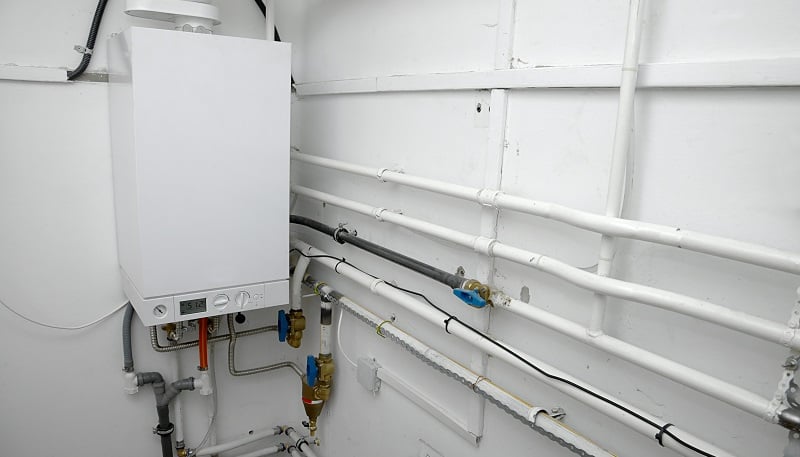
As a complex and potentially dangerous home appliance, boilers should largely be cleaned and maintained by a qualified HVAC contractor. Likewise, there may be considerable differences in various home units. Gas-fired, oil-fired, wood-burning, or other boiler fuel is just one of the differences that will likely entail specific cleaning and maintenance steps. That said, there are a few basic steps most homeowners can take to tune-up their home boiler, add years of service to the unit, and/or increase the interval between professional service calls.
1. Give the Boiler a Test Run: Like any heating or cooling system, the first step of annual maintenance is to turn the system on and determine if it appears to be in good working order. Run the boiler and heating system for 20-30 minutes and check to see if a) the boiler is producing heat, b) there is an even heat output to the vents/radiators, c) there are no signs of leaking water, and d) the boiler and pipes aren’t making any unusual noises. If there are signs of trouble, you might as well stop now and call in a professional contractor. The downside of this step is that you’ll have to wait for the boiler to cool back down before proceeding with other cleaning and maintenance steps.
2. Check Temperature and Pressure Readings: Most boiler units have a pressure gauge that should stay between 12-15 psi. This pressure is controlled by the expansion tank and pressure relief valve. Likewise, the boiler system likely has a set of temperature gauges and controls that set the room thermostat, boiler water temperature, circulating pump temperature, and/or temperature safety limits. Again, check the owner’s manual for proper readings, control settings, and troubleshooting signs.
3. Replace the Oil Filter: One of the more common home boilers, an oil-fired unit will likely require annual replacement of the oil filter. Turn off the boiler and the oil supply with the oil shut-off valve. Locate the oil filter and remove the housing cover. Remove the old filter and install a new one. This maintenance task will be much easier and safer with an owner’s manual.
4. Lubricate Circulating Pump: You might also take a look at any owner’s manual guidelines for lubricating the circulating pump. Some boilers will benefit from a few drops of pump lubricant to help the system’s water circulation and prevent other system failures.
5. Check the Expansion Tank: Check the water level of the expansion tank; most likely, it should be about half full. If it is more than half full, an expansion tank drain valve may allow you to return the tank to its proper level. However, if the tank begins to refill over the next few days, the tank likely has an air leak or needs to be recharged, and it’s time to call in the pros.
6. Check the Water Softener: Unless you live in an area where the water is already “”soft,”” your boiler will more than likely make use of a water softening system. Open the brine tank and check on salt and water levels. Break up any large chunks of salt. Replenish the salt and water levels as needed and clean out the brine tank if it’s dirty.
7. Check/Install Carbon Monoxide Detector: One potentially deadly consequence of a malfunctioning boiler unit is the emission and build-up of carbon monoxide gas. As such, you should have at least one, if not more, carbon monoxide detectors in your home. Now is a good time to check on battery life and run standard safety checks.
8. Burner, Coil, Draft Hood, and Chimney Cleaning: Even properly maintained boilers will see a gradual build-up of soot and other sediments in the burners, coils, draft hood, and chimney. The owner’s manual may allow you to disassemble and clean out some of these components, but virtually all homeowners will need to periodically hire an HVAC contractor and/or chimney sweep for more thorough cleaning. This may also give the homeowner a chance to show the contractor what boiler maintenance he or she typically performs and solicit advice for the next professional service call.
 Whole House Humidifiers
Whole House Humidifiers  Choosing Green: Boilers and Radiator Heating Systems
Choosing Green: Boilers and Radiator Heating Systems  Air Conditioner Covers
Air Conditioner Covers  Consider Wood-Burning Furnaces
Consider Wood-Burning Furnaces  Outdoor Heaters: a Refuge from the Cold
Outdoor Heaters: a Refuge from the Cold 

Boiler should be checked on the regular basis to avoid any issues. The water expansion tank from the boiler attached should also be checked properly. From my view you should hire the certified professional as they helps you out from this types of services.
You are right boilers are one of the dangerous home appliances in which most of us neglected or denied the truth about it. They think that it’s just an ordinary part of our home where they can make a DIY if in case things won’t work well. That’s why I always encourage my clients if in case something went wrong with the boilers I installed, they have to call me right away. Only professionals can do it safely.